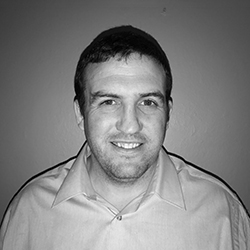Randy Stout

Title: Associate Professor
Department: Biomedical Sciences
Campus: Long Island
Area(s) of Expertise: Cellular neuroscience
Education Credentials: Ph.D.
Joined New York Tech: 2017
Neuroscientist and cell biologist Randy Stout, Ph.D., serves as an associate professor in the Department of Biomedical Sciences, as well as the director of the NYIT Imaging Center (NIC). He is also scientific director for the Biomedical Research Imaging Innovation Center (BRIIC) while it is being established in 2023.
The NIC is an institution-wide collaborative research center that serves as a hub for shared microscopy equipment, imaging expertise, and computing tools to gain new insights into biology and medicine. The NIC serves to enhance research for all NYIT faculty, staff, and students, along with collaborating researchers from other institutions. Many cutting-edge microscopes are included in the NIC, including a multi-color 3D STED microscope, a spatial multiomics imager, and several super-resolution light microscopes. The NIC collaborates with researchers to aid their research with advanced microscopy technology.
Research in Stout's laboratory focuses on how brain cells interact, namely glial cells, which are the cells that make up much of the human brain and are required for learning, cognition, brain homeostasis, and metabolic control. His glia research centers on their connections called gap junctions, which act as complex molecular machines and as sites of interaction between cells. They are critical to the development and function of tissues throughout the human body, with specialized roles in the brain. Understanding how these fascinating cellular connections contribute to symptoms associated with autism spectrum disorder and recovery from brain injuries, such as those that occur in multiple sclerosis and trauma, is critical to improving human quality of life. Using high-resolution light microscopy to reveal how molecules, cells, and tissues work, his work often tests how proteins and other biological molecules come together to form supramolecular machines that control the function of cells and determine how tissues function in healthy and disease states. His research examines how substances such as thyroid hormone and inflammation affect the brain by altering gap junctions and glia.
Stemming from his combined interest in sports and human brain function, Stout also has ongoing work using virtual reality technology for research and therapeutic application of new designs for athletic training, exercise-based therapy, and education. Working with medical students and alumni, the Stout lab builds virtual reality applications to allow new forms of human research and to develop more efficient training/education tools by leveraging emerging spatial computing technologies.
Stout has continuing collaborations with colleagues at Albert Einstein College of Medicine in Bronx, N.Y., where he did his postdoctoral training and research. His interest in glia and gap junctions started early in his post-graduate training at the University of California, Riverside, and continued during his doctoral training at the University of Alabama, Birmingham (Ph.D., Neurobiology). His interest in cell biology and genetics developed during his undergraduate training (B.S., Biology at Cornell University).
He is a member of several national societies including the New York Academy of Sciences, the American Thyroid Association, the American Society for Cell Biology, the Society for Neuroscience, the International Extracellular Vesicle Society, and the American Society for Neurochemistry (for which, in 2023, he serves on the ASN Council and as co-chair of the ASN Membership Committee).
Publications and Presentations
Professional Honors and Awards
- POWER 25 EDUCATION, Long Island Business News, Top 25 in Education in the Long Island Region, December 11, 2020.
- NYITCOM Positive STRIDES Recognition Program, Awarded for extensive efforts during the acceleration of the COVID 19 pandemic, November 17th, 2020.
- Early Career Reviewer Program, NIH Center for Scientific Review, 2019.
Courses Taught at New York Tech
- PPOM1 Neuroanatomy Laboratory and Lectures
- Case Based Learning Year 1
- Case Based Learning Year 2
- D.O./Ph.D. Research Methods Course